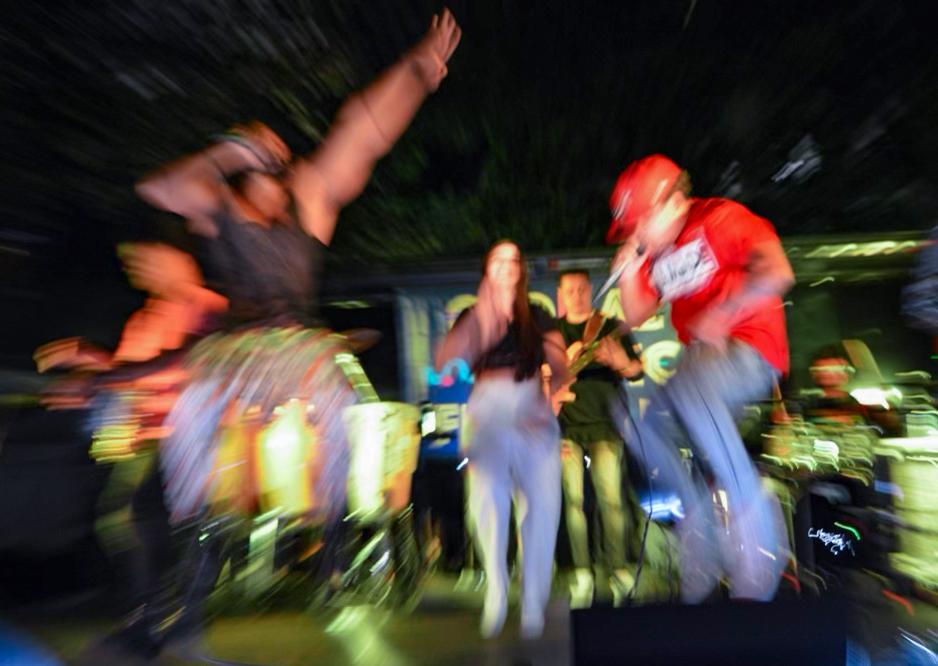
The Boston University Global Music Festival welcomed performance groups from across the world to perform on Saturday.
The festival opened with the Kingfisher Singers and Dancers, a group of Wampanoag performers. Marié Abe, the founder and artistic director of the festival and associate professor of musicology and ethnomusicology in the College of Fine Arts, said every year, she tries to find a local indigenous group to “perform on the land and bless the occasion” as the first performer of the day.
Jonathan James Perry, singer and dancer in the Wampanoag tradition with Kingfisher, said his group particularly enjoyed performing the Duck Dance Song because ducks are currently migrating to the south.
“A lot of our songs are based on what happens around us in our homeland, so it has to do with the earth, the plants, the medicines, the water, the fish,” he said. “These things are central to who and what we are as a people.”
The group’s final song, the Stomp Dance, Perry said, is for the plants, trees and other beings that “lack the ability to dance.”
“We dance for those beings, but we also acknowledge them,” Perry said. “We think about them in those songs, we think about them in those dances, so that we don’t forget our place in Creation.”
Perry said there should always be “consideration, acknowledgement and participation” of the original peoples and cultures of a place and that this should go beyond land acknowledgements, which he said can sometimes be “hollow.”
“I really think that the festival and the organizers did an excellent job of making sure that participation was here and was a thoughtful process … having native performers as part of your event, having native symbology or native consultations throughout your process,” Perry said. “I really encourage anyone else to also take those teachings into consideration when they’re doing anything.”
Next to perform was the Yamma Ensemble, which uses ancient musical instruments typical of the Middle East. The group is from Israel, Abe said, but they interpret Jewish music from the Mediterranean to the Middle East.
According to the group’s biography, the Yamma Ensemble has achieved international acclaim but “managed to remain authentic, local, and loyal to the region in which it developed and was born.”
Following the Yamma Ensemble was Puuluup, a group described by Abe as a “super quirky Estonian duo.”
Performing on a talharpa, or bowed lyre, the duo encouraged the audience to stand up and dance. Many audience members joined hands and formed a circle during one of Puuluup’s songs.
Qwanqwa, a quintet performing an experimental take on Ethiopian traditional music, performed after Puuluup. Kaethe Hoffstetter, the group’s founder, said Qwanqwa’s setlist for the festival was “fun” and would “ramp up” the crowd.
“We hope to get people dancing in the grass,” Hoffstetter said. “We’ve been wanting to do this for a long time.”
San Rompe Pera, a group from Mexico, and Saung Budaya Dance, based in Indonesia and New York City, performed next. Finally, the Bazurto All Stars made their Boston debut as the festival’s headliner performing Champeta music. Abe described the group as a “powerhouse.”
“It’s going to be huge and powerful and a huge dance party,” Abe said.
Madalitso, a duo from Malawi, was also scheduled to perform but had to be removed from the lineup due to last minute Visa issues, Abe said.
To bring international groups to the BU Global Music Festival, Abe said she connects with arts presenters who are also interested in bringing global musicians to the United States because it is a “delicate balancing act of covering different parts of the world.”
In terms of searching for groups to perform, Abe said she seeks indigenous and women performers because they tend to be the minority voices at festivals such as this one, and groups or performers who have some connection to Boston.
“We try to bring in locally based but global artists to foreground the fact that ‘global’ isn’t ‘international’ or ‘abroad’,” Abe said. “Boston is a global city. It’s about these dynamic interrelations between places on the globe.”
























































































































